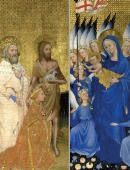Obituary: Philip Trower
Article:
30.04.19
Obituary: Philip Trower
Philip Trower, Catholic writer, died earlier this year. His books on theology and history attracted considerable interest from a younger generation of Catholics, shaped by Pope John Paul II. A warm admirer of John Paul, he saw the years that immediately followed the Second Vatican Council as a time of turmoil that emerged into greater confidence and unity through the efforts of the Polish Pope.
Born on May 16th, 1923) to Sir William Gosselin Trower and Joan Olivia Tomlin, John Philip Trower was educated at a preparatory school in Dorset and then privately with a family in France, followed by four years at Eton. He belonged to an Anglican family – an ancestor wrote Trower on the Epistles, a noted Biblical commentary - but took an early interest in Catholicism partly through the influence of his French governess.
Trower joined the Army in 1942, was commissioned into the Rifle Brigade in 1943, saw service in the Italian campaign and sustained a shrapnel wound in his arm in Rome during the Battle of Anzio. He later enjoyed recalling that he had acquired skills in basket-weaving and embroidery as part of compulsory occupational therapy while recovering. On returning to active duty he served in Egypt with an intelligence unit based in Cairo.
Writing career
His writing career began after demobilisation the 1950s, when he became a regular contributor to The Spectator and the Times Literary Supplement. His first novel, Tillotson, was published in 1951 by Collins and received a Book Society commendation at the instigation of the historian Veronica Wedgewood and novelist Rose Macaulay.
Another novel written at this time did not see the light of day until the 1990s when its existence was revealed in a casual conversation with a Catholic journalist and it was unearthed and sent to Ignatius Press in the USA. Published as A Danger to the State, it is centred on the suppression of the Jesuits and the tragedy following the destruction of their work in South America, and received favourable reviews and considerable popularity.
Trower became a Catholic in 1953 partly under the influence of his friend the poet Dunstan Thompson, whose literary executor he became after the latter’s death. Thompson had for some years abandoned his childhood Catholicism, but returned during a procession at the Catholic shrine at Walsingham in Norfolk which the two had gone to watch simply because they lived nearby. Trower had, as he would later write, long been fascinated by the Catholic faith and regarded it as intellectually more coherent and convincing than Anglicanism, as well as spiritually compelling in its Eucharistic doctrine.
Noted contributor
He went on to become a noted contributor to Catholic newspapers and magazine in Britain, the USA, and Canada, frequently focussing on the tensions and controversies following the Second Vatican Council. He took a positive view of the Council, which he regarded as a necessary continuation of the First Vatican Council ( which took place in the 19th century) involving the developing understanding of the Church’s teaching. But he believed that in the postconciliar years, its message had been hijacked and that there had been a loss of intellectual coherence. His books Turmoil and Truth and The Catholic Church and the Counterfaith reflected his concern – and that of others including leading figures of the Council such as Cardinal Joseph Ratzinger (now Pope Emeritus Benedict XVI) - about the ways in which the Council’s message was distorted.
Trower enjoyed a moment of fame in 2018 by finally attending his Oxford degree ceremony sixty years after graduating. Following a shortened wartime course at Oxford he gained a BA but by the time he received his exam results he was already in the Army. In the summer of 2018, his nephews decided that he should finally graduate and arranged for him to do so. The event received considerable media coverage, with Trower, arriving in a wheelchair, characteristically saying that his failure to graduate earlier was due to “sheer inefficiency on my part”.
Philip Trower was a strong supporter of FAITH magazine and contributed a number of features over the years. His funeral Mass, concelebrated by several priest friends, was held at Nazareth House, Cheltenham. Unmarried, he was close to his wider family and spent his last years living with or near them in Hertfordshire and Cheltenham. A memorial service was held in April at the family’s church at St James' Church, Stanstead Abbotts.





